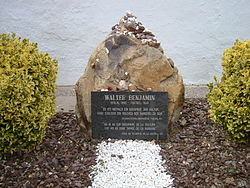On September 26, 1940, at the age of 48, Walter Benjamin committed suicide at Portbou on the French–Spanish border while attempting to escape from invading Nazi forces.
Walter Bendix Schönflies Benjamin (15 July 1892 – 26 September 1940)was a German Jewish philosopher, cultural critic and essayist. An eclectic thinker, combining elements of German idealism, Romanticism, Western Marxism, and Jewish mysticism, Benjamin made enduring and influential contributions to aesthetic theory, literary criticism, and historical materialism. He was associated with the Frankfurt School, and also maintained formative friendships with thinkers such as playwright Bertolt Brecht and Kabbalah scholar Gershom Scholem. He was also related by law to German political theorist and philosopher Hannah Arendt through her first marriage to Benjamin's cousin, Günther Anders.
In 1932, during the turmoil preceding Adolf Hitler's assumption of the office of Chancellor of Germany, Walter Benjamin left Germany for the Spanish island of Ibiza for some months; he then moved to Nice, where he considered killing himself. Perceiving the socio-political and cultural significance of the Reichstag fire (27 February 1933) as the de facto Nazi assumption of full power in Germany, then manifest with the subsequent persecution of the Jews, he moved to Paris, but, before doing so, he sought shelter in Svendborg, at Bertolt Brecht's house, and at Sanremo, where his ex-wife Dora lived.
As he ran out of money, Benjamin collaborated with Max Horkheimer, and received funds from the Institute for Social Research, later going permanently into exile. In Paris, he met other German artists and intellectuals, refugees there from Germany; he befriended Hannah Arendt, novelist Hermann Hesse, and composer Kurt Weill. In 1936, a first version of "The Work of Art in the Age of Mechanical Reproduction" ("L'œuvre d'art à l'époque de sa reproduction méchanisée") was published, in French, by Max Horkheimer in the Zeitschrift für Sozialforschung journal of the Institute for Social Research. It was a critique of the authenticity of mass-produced art; he wrote that a mechanically produced copy of an artwork can be taken somewhere where the original could never have gone, arguing that the presence of the original is "prerequisite to the concept of authenticity".
Returning to Paris in January 1940, he wrote "Über den Begriff der Geschichte" ("On the Concept of History", later published as "Theses on the Philosophy of History"). While the Wehrmacht was pushing back the French Army, on 13 June Benjamin and his sister fled Paris to the town of Lourdes, just a day before the Germans entered the capital with orders to arrest him at his flat. In August, he obtained a travel visa to the US that Max Horkheimer had negotiated for him. In eluding the Gestapo, Benjamin planned to travel to the US from neutral Portugal, which he expected to reach via Francoist Spain, then ostensibly a neutral country.
Walter Benjamin's grave in Portbou. The epitaph in German, repeated in Catalan, quotes from Section 7 of Theses on the Philosophy of History: "There is no document of culture which is not at the same time a document of barbarism"
The others in his party were allowed passage the next day (maybe because Benjamin's suicide shocked Spanish officials), and safely reached Lisbon on 30 September. Hannah Arendt, who crossed the French-Spanish border at Portbou a few months later, passed the manuscript of Theses to Adorno. Another completed manuscript, which Benjamin had carried in his suitcase, disappeared after his death and has not been recovered. Some critics speculate that it was his Arcades Project in a final form; this is very unlikely as the author's plans for the work had changed in the wake of Adorno's criticisms in 1938, and it seems clear that the work was flowing over its containing limits in his last years.
"Geschichten der Freundschaft" is an insisting documentary film with quotes from letters and diaries about the friendship with Gershom Scholem, Theodor W. Adorno, Bertolt Brecht, the "Passagen", living in the exile and the Shoah.
Walter Benjamin - Geschichten der Freundschaft
(documentary film in German language, 52 minutes, 2010)


2 Kommentare:
Danke für den Film. Es wird höchste Zeit sich wieder an den Antifaschismus zu erinnern.
Viele Grüße aus Berlin
I totally agree! Greetings to Berlin!
Kommentar veröffentlichen